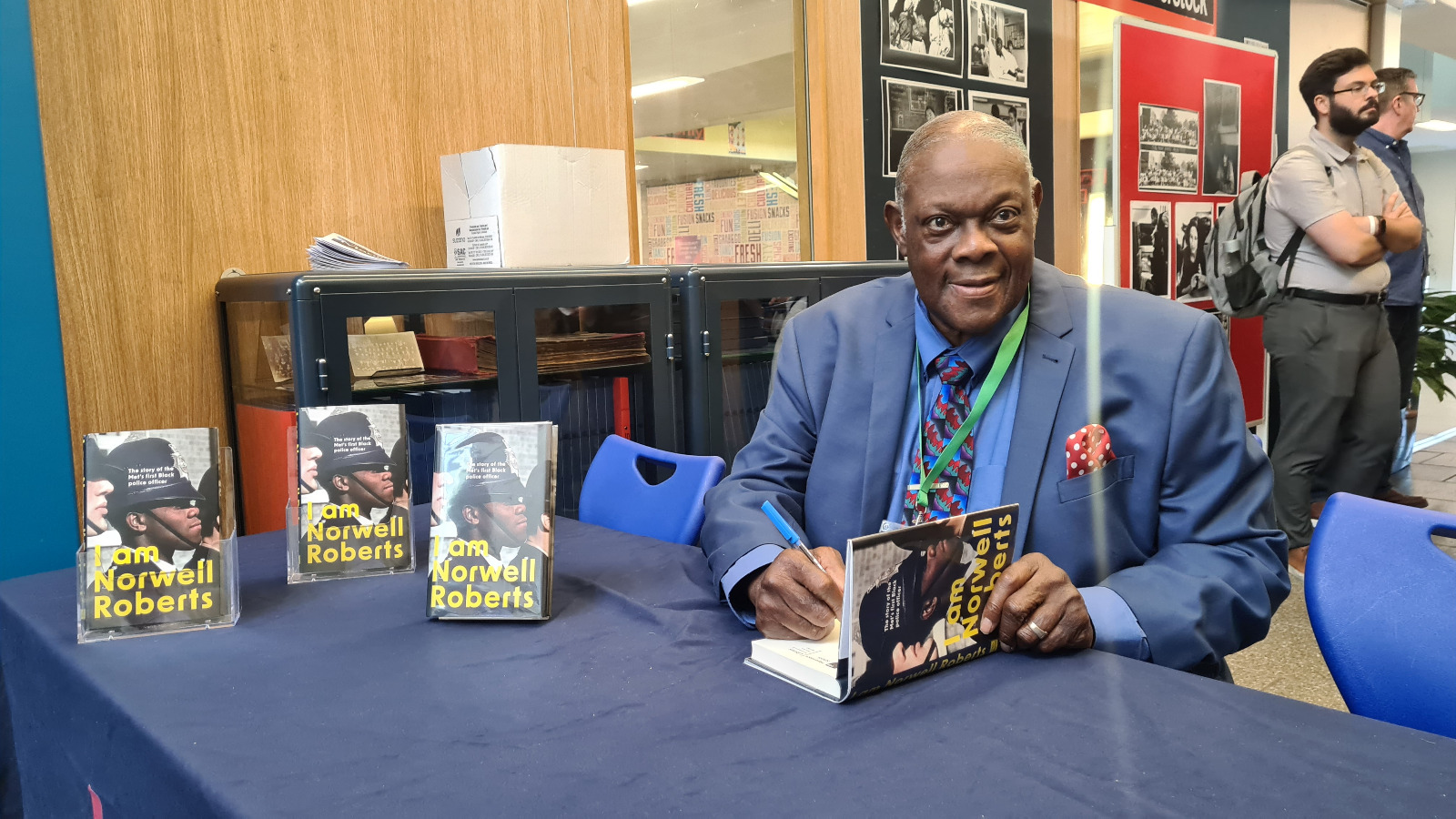Met’s first black police officer goes back to his old school
Norwell Roberts was once a pupil at Haverstock School
Sunday, 17th July 2022 — By Harry Taylor

Norwell Roberts at Haverstock School
A FORMER Haverstock school pupil who went on to become the first black police officer in the Metropolitan Police says recent revelations about racism in the force show that “time has stood still”.
Norwell Roberts, who joined the Met in 1967, was visiting the school in Haverstock Hill to see a presentation students made after researching him during Black History Month.
He has recently released his autobiography, I Am Norwell Roberts.
He made it to the rank of detective sergeant before retiring in 1997, but he told the New Journal how he was treated by fellow officers, including cups of tea being thrown at him, being ignored and shunned by colleagues, and facing racist abuse from senior officers.
“I walked in on my first day at Bow Street station and the sergeant said, ‘Look at me n*****, I will see that you won’t finish your probation’. People were scared. It’s not like today where people will stick up and stand up for you. What hurt me was two boys who came with me through training, they sided with the other boys to be popular.”
Work improved for Mr Roberts when he joined CID and the flying squad, finding it less racist, but he said it drifted from “overt to more of an undercurrent”.
He added: “I was working in Barnet in the early 1990s, and I put in to go and work in child protection. About four weeks later I asked my guv’nor what the result of my application was. He just half laughed and half sneered at me.
“It was just sitting on his desk. He hadn’t sent it in. Now, I don’t know if that was just down to racism, but still…”
When asked about his opinions on the current state of the Met, he said he was shocked at the revelations about racism at Charing Cross Police station and Met Police officers sending messages and photographs after the murder of Bibaa Henry and Nicole Smallman in 2020.
“If you remember, Bow Street station was closed down, Charing Cross station is what replaced it. I am talking about things 50 years ago in the late 60s and 70s and, hey presto, it is still going on,” he said.
“They haven’t learnt anything. It’s like time has stood still. It is totally stupid – how can people not realise that they are not going to get away with it?”
Mr Roberts left Haverstock in 1962 after two years in the senior school, and the last time he was back inside the school he was investigating a burglary in the 1980s.
He had moved to Camden from Bromley, Kent, where he had arrived after coming over from Anguilla in 1956. His mother had arrived two years earlier on the HMS Windrush. They lived in St Pancras Way, Somers Town.
“When I moved to London I had never seen so many black people and Asian students, it was lovely, nobody stared at me. I was a prefect here. It was rough down in Somers Town, Teddy Boys looking at someone in the wrong way and there would be a fight,” he said.
“It’s much different now, everywhere is different. This school is different, it has been rebuilt, it was old-school buildings, the gymnasium was over that way, and the entrance was in Crogsland Road.”
He eventually applied to join the Met, while at Paddington Technical College, after seeing an advert in the Daily Mirror. Later a headline in the Daily Telegraph said London would have its “first coloured policeman soon” – it was Mr Roberts.
After more than 30 years’ service, he retired in 1997. He had been awarded the Queen’s Police Medal in 1996.
“I used to go and cry in the bathroom of the section house when I started,” he said.
“But I realised that if I didn’t make a success of it then other young black people would look at me and think they couldn’t too. I was happy that I was big enough and bad enough to do it.”